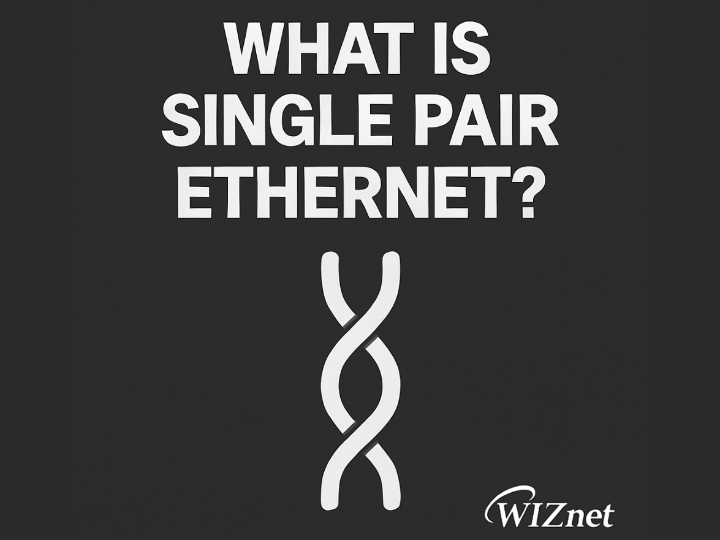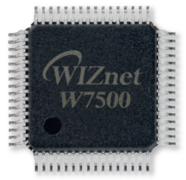What is Single Pair Ethernet (SPE)?
What is Single Pair Ethernet (SPE)?

Industrial communication is evolving rapidly, yet traditional fieldbus systems remain complex and segmented. Single Pair Ethernet (SPE) addresses these issues with a streamlined technology that enables stable Ethernet communication over just a single twisted pair cable. This article introduces the concept of SPE and explains how to implement it using WIZnet's W7500 MCU and a range of 10BASE-T1L PHYs.
What is Single Pair Ethernet (SPE)?
Conventional Ethernet uses two pairs (100BASE-TX) or four pairs (1000BASE-T) of twisted cables. In contrast, SPE (Single Pair Ethernet) enables Ethernet communication with only one pair, offering a smaller, lighter, and long-distance-capable solution for industrial applications.
✅ Key Features of SPE
- Cable Simplification: Ideal for space-constrained environments (robot arms, sensors, etc.)
- Low Power & Long Distance: 10BASE-T1L supports communication up to 1km
- PoDL (Power over Data Line): Power and data transmitted over a single line
- Fieldbus Replacement: Integrates well into industrial Ethernet networks
✅ Key SPE Standards
| Standard | Speed | Distance | Description |
|---|---|---|---|
| 10BASE-T1S | 10 Mbps | 15m | Multi-drop support |
| 10BASE-T1L | 10 Mbps | Up to 1000m | Long distance, point-to-point topology |
| 100BASE-T1 | 100 Mbps | Up to 40m | Adopted in automotive/industrial use |
Why Combine W7500 with a 10BASE-T1L PHY?
✅ Overview of W7500
- ARM Cortex-M0-based MCU
- Built-in hardware TCP/IP core + Ethernet MAC
- Supports MII interface for external PHY connection
- Includes peripherals such as UART, SPI, and Timers
✅ Examples of 10BASE-T1L PHY Options
Here are some widely supported PHY chips compatible with the W7500:
1. TI DP83TD510E
- Features: Compliant with IEEE 802.3cg, up to 2000m range, ultra-low power (min. 30mW)
- Interface: MII, RMII, RGMII support
- Applications: Industrial automation, building control
2. Analog Devices ADIN1100
- Features: Supports 10BASE-T1L, ultra-low power (min. 39mW), up to 1700m range, excellent EMI/EMC immunity
- Interface: MII, RMII, multiple package options
- Applications: Process control, sensor networks, industrial edge nodes
3. Analog Devices ADIN1110
- Features: Integrated MAC + PHY, SPI interface, ultra-low power, supports PoDL
- Interface: SPI (built-in MAC-PHY)
- Applications: Compact microcontroller-based systems, low-cost SPE modules, building automation
By connecting these PHYs to the W7500, you can easily implement a lightweight Ethernet node with direct MCU-to-PHY communication.
Hardware Configuration: W7500 + 10BASE-T1L PHY
Block Diagram
Key Hardware Connections
| Interface | Description |
|---|---|
| MII (TXD/RXD) | MAC–PHY data transfer |
| MDC / MDIO | PHY register management via W7500 |
| XTAL 25MHz | Required clock input for PHY operation |
| Power & Ground | Typically 3.3V or 1.8V depending on PHY specs |
| Protection Circuit | ESD/Noise shielding with TVS diodes, etc. |
MII Interface Details
The core of this configuration lies in the MII (Media Independent Interface) that connects W7500’s MAC to the external PHY. MII includes data lines (TXD/RXD), control lines (TX_EN, RX_DV), and clock signals.
Example pin mapping between W7500 and 10BASE-T1L PHY:
| W7500 Pin | PHY Pin | Description |
|---|---|---|
| TXD[3:0] | TXD[3:0] | Transmit Data |
| RXD[3:0] | RXD[3:0] | Receive Data |
| TX_EN | TX_EN | Transmit Enable |
| RX_DV | RX_DV | Receive Data Valid |
| MDC | MDC | Management Data Clock |
| MDIO | MDIO | Management Data I/O |
| CLK | 25MHz Input | Clock Synchronization |
Additional requirements include appropriate power supply design, crystal oscillator, reset circuitry, and protection against ESD and electrical noise.
Notes
- Most 10BASE-T1L PHYs use SPE-specific connectors (e.g., IEC 63171-1/6), not standard RJ-45.
- The MDI side often requires transformers or common-mode chokes for signal integrity.
Conclusion: SPE is the Future of Industrial Networking
Combining W7500 with a selection of 10BASE-T1L PHYs offers a practical, cost-efficient approach to implementing SPE-based edge devices. This setup enables high-speed, long-range Ethernet over a single pair—without relying on expensive SoCs.
🌐 “Bring Ethernet to the edge with the next-generation industrial standard—start your SPE project today.”
Reference Links

